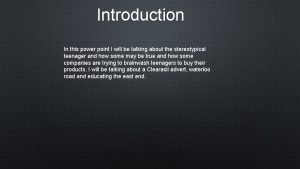psychlotron org uk What does this advert suggest











- Slides: 11

psychlotron. org. uk What does this advert suggest about children’s behaviour?

Today’s session You will learn how to. . . You will learn about. . . and apply l. Social learning theory psychological approaches & l. Research by Bandura theories (1965) l. Consider the relationship between an approach and its methods l. Compare and distinguish between approaches psychlotron. org. uk l. Describe

Behaviourism R Behaviourists aren’t interested in what happens in between S and R. They don’t think you need to know. psychlotron. org. uk S

Social learning theory S O R psychlotron. org. uk Social Learning Theorists say that things take place within the organism that mediate between S and R. You do need to know about the person’s mental processes.

Social learning theory • Agrees with behaviourist learning theories – Classical conditioning – Operant conditioning – Mediating processes between stimuli & responses – Observational learning psychlotron. org. uk • Adds two important ideas:

psychlotron. org. uk Bandura’s SLT research

psychlotron. org. uk • What did the children need to do in order to reproduce the behaviour later?

Attention A person pays attention to someone else’s behaviour Encoding They memorise the behaviour they have observed Imitation They practice the behaviour themselves Motivation Given a reason, they may use it psychlotron. org. uk Social learning theory

Social learning theory Observation Model & modelling Imitation Reinforcement & punishment Vicarious reinforcement & punishment psychlotron. org. uk • • •

Bandura (1965) psychlotron. org. uk Aims and conclusions External validity Internal validity Ethical issues

• What is the observer paying attention to? • How effectively have they encoded the behaviour? • How able are they to reproduce the behaviour? • Do they have the motivation to perform the behaviour? psychlotron. org. uk Mediating factors





















